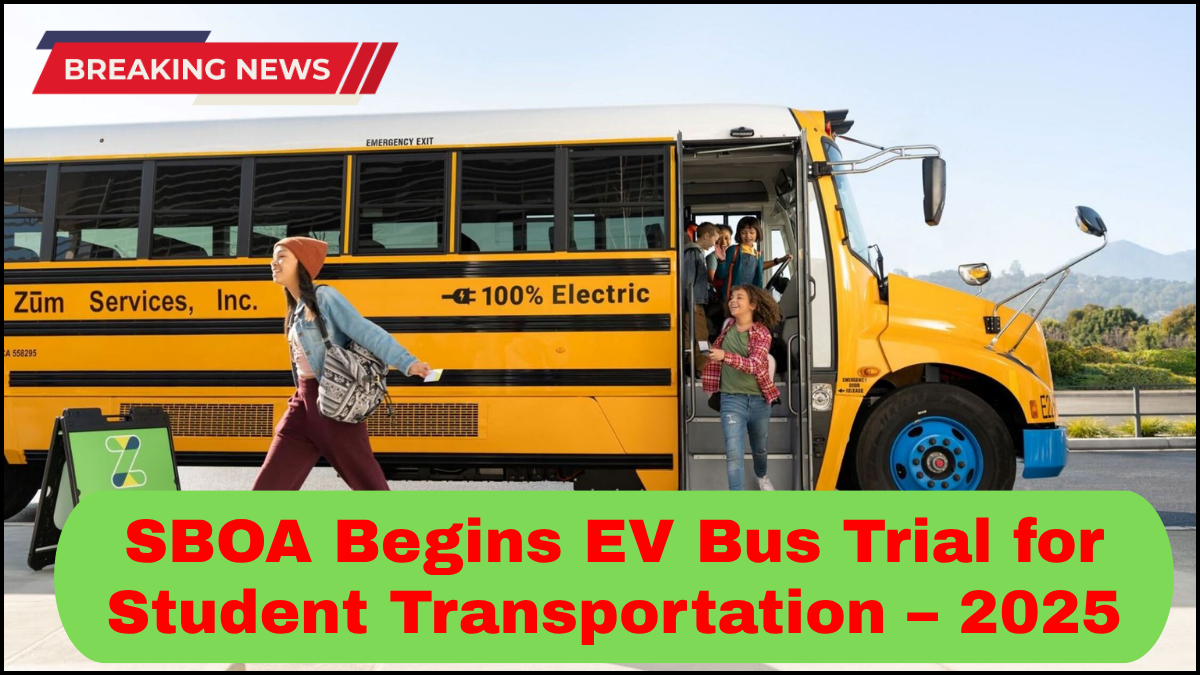In a bold move towards sustainable mobility and eco-conscious education, the SBOA (State Bank Officers’ Association) schools have officially launched a school EV bus trial run for student transportation in 2025. This marks a significant shift in how schools approach student transit, aligning with broader environmental goals and setting a powerful precedent for other educational institutions.

A Strategic Move Toward Green School Transport
The shift to green school transport is not just about switching fuel types — it’s a comprehensive strategy to reduce carbon emissions, improve air quality around schools, and instill eco-friendly values in the next generation. With growing concerns over urban pollution and climate change, adopting electric vehicles (EVs) in school transport is both timely and necessary.
SBOA’s trial involves a fleet of fully electric buses deployed on select routes to assess performance, efficiency, and student experience. These buses are equipped with zero-emission technology, advanced safety features, and real-time monitoring systems to ensure a secure and reliable commute.
Why Electric Buses for Schools?
Electric buses offer a cleaner, quieter, and more sustainable alternative to traditional diesel-powered school buses. Each EV bus eliminates tailpipe emissions, significantly cutting down nitrogen oxides, particulate matter, and greenhouse gases. According to studies, a single electric bus can offset up to 50,000 pounds of CO₂ annually compared to its diesel counterpart.
For SBOA schools, the school EV bus trial run is a calculated step to transition into a future-ready, environmentally responsible institution. It also reflects a deep commitment to student health, as diesel exhaust is known to exacerbate asthma and other respiratory conditions—issues that are particularly concerning in growing children.
Technology Meets Sustainability
The trial run is supported by partnerships with local electric bus manufacturers and charging infrastructure providers. The buses come fitted with GPS, CCTV, speed governors, and live tracking features. These innovations not only increase student safety but also offer parents real-time updates and peace of mind.
Charging stations have been installed on school premises and at major pickup/drop-off hubs. With fast-charging capabilities, the buses can be recharged during off-school hours, minimizing operational downtime and ensuring efficient route planning.
Environmental and Educational Impact
Beyond transportation, the SBOA initiative plays an educational role. Students are being taught about electric vehicles, renewable energy, and sustainability through workshops and interactive sessions. The goal is to make the transition not just logistical but cultural—where students are active participants in the shift toward eco-conscious living.
The green school transport initiative also aligns with national and global sustainability agendas, such as India’s target to achieve net-zero emissions by 2070. By investing early in EV technology, SBOA schools are positioning themselves as leaders in climate-responsible education.
Challenges and Forward Planning
While the trial has shown promising early results, SBOA is also monitoring several key metrics including battery performance, maintenance costs, range efficiency, and student feedback. One of the major challenges is the cost of procurement and infrastructure development. However, government subsidies and public-private partnerships are helping offset these expenses.
If the school EV bus trial run proves successful over the next several months, SBOA plans to expand the initiative to all its branches nationwide by 2026. This will make it one of the first major school networks in India to operate a fully electric student transport fleet.
FAQs
What is the purpose of the SBOA school EV bus trial run?
The trial is designed to test the feasibility, efficiency, and impact of electric buses in daily student transportation. It supports the transition to a sustainable and eco-friendly transport model.
How does this benefit students and the environment?
Electric buses reduce air pollution and noise, offering a safer and cleaner environment for students. They also promote environmental awareness among young learners.
Are EV buses safe for school children?
Yes, the electric buses are equipped with advanced safety features including speed governors, CCTV, GPS, and emergency alert systems to ensure the highest level of security.
Will this initiative be expanded to other schools?
If the trial is deemed successful, SBOA plans to roll out the EV bus system across all its campuses nationwide by 2026.
What makes green school transport different?
Green school transport involves not only using zero-emission vehicles but also integrating sustainable practices into the school’s daily operations and student education.
click here to learn more